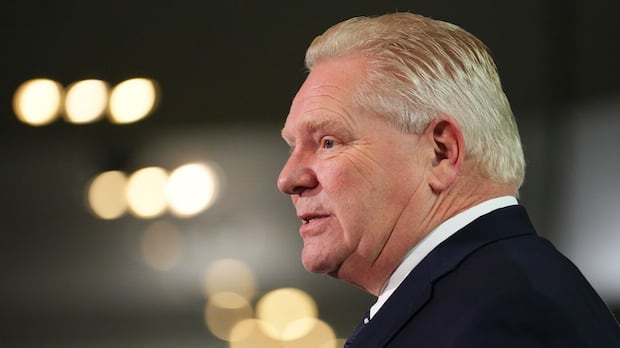U.S. auto tariffs may be less severe than initially thought, says Doug Ford
Ford says U.S. Commerce Secretary told him tariffs on vehicles made outside U.S. may only be 12.5%, not 25%
Ontario Premier Doug Ford says U.S. Commerce Secretary Howard Lutnick has told him that impending auto tariffs may not apply to some finished vehicles entering the United States from Canada.
On Wednesday, U.S. President Donald Trump said he'd signed an executive order to slap a 25 per cent import tariff on vehicles not made in the U.S. after April 2. He vowed to follow that with a 25 per cent tariff on some auto parts made outside the U.S. in May, potentially leading to an eventual tariff on all auto parts.
But Ford told reporters Thursday that tariffs on vehicles imported from Canada may be lower than Trump initially indicated.
Ford said he spoke with Lutnick Wednesday night, and he told him vehicles made with more than 50 per cent U.S.-made parts won't be subject to tariffs.
Two senior officials in Ford's government, speaking anonymously because they are not authorized to discuss negotiations publicly, told CBC Toronto they're trying to figure out how many vehicles partly made in Canada wouldn't be tariffed under that definition.
Ford said he was also informed that vehicles from Canada that are made with less than 50 per cent American-made parts will be tariffed at 12.5 per cent, half of what Trump said Wednesday.
Despite the possibility of a softer blow, Ford said the reduced tariff is still "not good at all."
Another official privy to recent Canada-U.S. discussions said the sides have been talking for days about a potential reprieve, and discussions have been positive.
"The fat lady hasn't sung until April 2nd," said the official, who is also not authorized to discuss negotiations publicly. "We hope we can take it further."
Ford, Carney say they will wait to retaliate
Since Trump began threatening tariffs against Canada, it has been hard to predict exactly what will apply. He has threatened and paused tariffs multiple times since coming into office.
The threats have come as a devastating blow to thousands of workers in Ontario, where the auto sector is one of the province's largest sources of employment. Some experts say the tariffs could lead to shut down North America's highly-integrated auto sector, where auto parts can pass between Canada, Mexico and the United States multiple times before a vehicle is finished.
Ford said Wednesday that Trump's auto tariff announcement came as a surprise, and that he thought he would be informed ahead of time.
Ford said Thursday that he would soon be meeting with Canada's premiers and prime minister, as well as the CEOs of General Motors, Ford and Stellantis.
He said that he's in support of retaliatory tariffs to "inflict as much pain as possible" on American consumers.
"I had a good conversation with the prime minister. He agrees 100 per cent," he told reporters Thursday, prior to Prime Minister Mark Carney's address to Canadians.
Carney interrupted his election campaign Thursday to lead a meeting on Canada-U.S. trade relations. In a news conference Thursday afternoon he said Canada would wait until after April 2 to respond to Trump's tariffs, but said the ongoing trade war was possibly the "crisis of our lifetimes" as Canadians.
Carney previously announced a $2-billion proposal to protect Canada's auto industry. The "strategic response fund" would be used to boost the auto sector's competitiveness, protect manufacturing jobs, help workers gain expertise and build "a fortified Canadian supply chain," he said Wednesday.
Ontario auto workers 'sick of being antagonized'
Ontario auto workers have been dealing with uncertainty for months now.
Members of the union representing workers at Oshawa's General Motors plant gathered there Thursday with Unifor's national president to discuss a strategy to fight back.
"In the beginning we were a little bit nervous," Unifor Local 222 president Jeff Gray said of Trump's tariff threats, which started even before he came into office in January. "But now we're sick of being antagonized."
Trump has said auto companies should move production into the U.S. to avoid tariffs, but Unifor's national president Lana Payne told members Thursday that Canada's auto industry "is not Donald Trump's to steal."
"If you think that you can shift production, factories, mills and reinvest in the United States out of Canada and think that you're going to have open access to our market, you need to think again," she said.

Bill McCollom, union chair at Lear Oshawa, which makes seats for GM trucks, says he has 350 workers who would be out of business if GM moved, including close to a hundred Ukrainians whose status in Canada depends on the work. Even Oshawans who don't work in the auto sector would be hit hard, he said.
"When this happened a few years back, Oshawa basically became a ghost town," he said of 2018, when the plant closed. It later reopened following union negotiations.
Multiple workers outside the Oshawa plant told CBC Toronto Thursday that the provincial and federal government should hit back hard and do what they can to support auto workers.
Chris Vavassori, who entered the auto industry in 1995, was one of them. He said Ottawa and Ontario Premier Doug Ford "should be throwing everything on the table" to protect Canadian jobs.
With files from Lorenda Reddekopp, Alexander Panetta and CBC News Network



